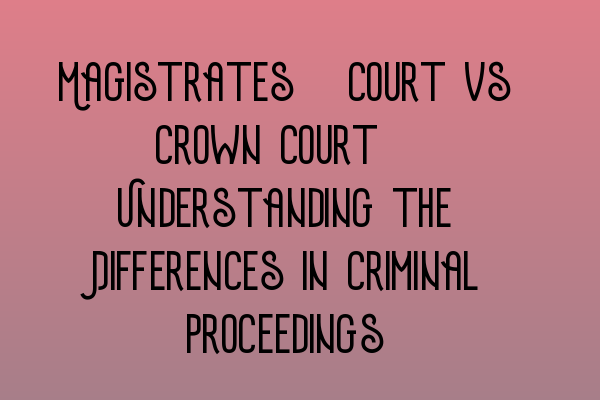Magistrates’ Court vs Crown Court: Understanding the Differences in Criminal Proceedings
When it comes to criminal proceedings in the UK, two key courts play a significant role: Magistrates’ Court and Crown Court. Understanding the differences between these two courts is crucial in comprehending the complexities of the criminal justice system.
Magistrates’ Court – A Summary
The Magistrates’ Court is the lower level of the court system, and it handles the majority of criminal cases. This court consists of volunteer magistrates (also known as justices of the peace) who do not possess professional legal qualifications but are provided with training to carry out their roles effectively. Magistrates’ Courts deal with summary offenses (less serious offenses), such as minor assaults, theft, and traffic violations.
Being cost-effective and more accessible, Magistrates’ Courts ensure quick resolution of cases. Additionally, these courts make initial decisions on cases that are ultimately transferred to the Crown Court for trial.
Crown Court – A Summary
The Crown Court, on the other hand, is a higher level court that deals with more serious offenses, such as murder, rape, fraud, and drug trafficking. Unlike the Magistrates’ Court, the Crown Court is presided over by a judge who possesses professional legal qualifications and often includes a 12-member jury.
The Crown Court primarily handles cases that have been sent for trial from the Magistrates’ Court and hears appeals against decisions made by the Magistrates’ Court. Proceedings in the Crown Court are more formal and complex, often involving barristers and solicitors representing the prosecution and defense.
Differences in Sentencing Powers
One important distinction between the Magistrates’ Court and the Crown Court is the difference in sentencing powers. The Magistrates’ Court can impose a maximum sentence of up to 12 months imprisonment for a single offense, while the Crown Court has the authority to impose much longer sentences, including life imprisonment for more serious crimes. The Crown Court also possesses the power to impose fines and issue community orders.
Choosing the Right Court
Deciding whether a case should be dealt with in the Magistrates’ Court or the Crown Court depends on various factors, such as the seriousness of the offense, the complexity of the case, and the availability of legal representation. It is crucial to seek professional legal advice to ensure that the most appropriate court is chosen for your specific circumstances.
Understanding the key differences between Magistrates’ Court and Crown Court is essential for anyone involved in or seeking to understand the criminal justice system in the UK. Whether you are a defendant, a witness, or simply an interested party, comprehending the roles and functions of these courts is vital in navigating the legal landscape.
For more information on related legal topics, you may find the following articles helpful:
- Demystifying the Solicitors Qualifying Examination Format
- LLC Formation Made Simple: Step-by-Step Guide for UK Entrepreneurs
- LLC Formation: A Step-by-Step Guide for UK Entrepreneurs
- Business Regulations in the UK: A Comprehensive Overview
- Ethical Considerations in UK Law: Upholding Professional Standards
